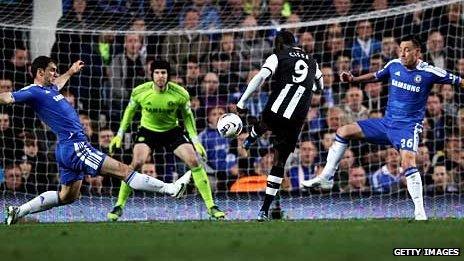Football transfer numbers and costs in global fall
- Published

International football transfer numbers and player buying fees have fallen sharply worldwide in the past six months, says governing body Fifa.
Completed player deals fell by 9% in the first six months of 2012, but their total financial value plunged by more than a third, falling by 34%.
Total income from 4,973 transfers around the globe was $576m (£371m).
The drop may be due to continued global economic problems and the forthcoming Uefa financial fair play rules.
The data was revealed by Fifa's Transfer Matching System (TMS) organisation, which uses modern electronic technology with the aim of making international football transfers more transparent and legally compliant.
'Balancing books'
"We still have to see what happens in July and August, when European transfer windows are open, to see if this [drop] is just a dip or part of a continuing trend," said Isabelle Solal, head of integrity and compliance at Fifa TMS.
"However, if I personally was asked to pick reasons, I would say it is still because of economic recession and the impact of the Uefa financial fair play sanctions.
"Clubs are making an effort to balance their books, but things should be clearer by September," said Ms Solal, speaking to the BBC News website at a World Sports Law Report conference into football player contracts.
The figures refer to international transfers and do not cover "domestic" transfers between two clubs in the same country.
The financial fair play rules have been introduced by European football's governing body to ensure that clubs only spend cash, including on big-name star signings, from revenues that they have created, rather than through borrowing or handouts from rich owners.
Transfer windows
The big five European leagues - England, Germany, France, Italy and Spain - have transfer windows that run from 1 July to 31 August. Scotland has a similar transfer window.
And with most of the deals done in the first half of the year taking place during the January transfer windows in Europe, July and August are the two months when most global trading in the second half of the year will take place.
Despite the riches flooding into the Premier League in England - it recently renewed its domestic TV deal for a massive £3bn - there were few high profile international purchases during January.
Newcastle United bought Papiss Demba Cisse for £10m from Freiburg in Germany, and Chelsea bought Kevin de Bruyne from Genk in Belgium for £9m.
However many other clubs opted for loan signings, securing unattached players or cheaper purchases from the lower leagues in England.
'More effective'
The TMS is an online system for registering international transfers and has replaced the old set-up of documents based on paper.
In order for for a transfer to be validated, the two clubs involved must enter the relevant information on the deal into the TMS system.
However, in the first six months of 2012, the amount of fines that Fifa TMS has imposed on clubs for not complying properly with transfer regulations has almost reached the total for the whole of 2011,
"We are much more effective as a compliance department, and despite the number of transfers being down, we are finding more infringements as we grow into our role," said Ms Solal.
"We have a big focus on compliance education," she added. "We spend a lot of time trying to help clubs and associations understand the transfer market better.
"We have the technology that allows the information necessary for each transfer to be accessible to both parties, even if they are at other ends of the globe.
"It is great that sport is using the sort of technology that is widely used in business, and it is enabling us to become even more professional in our operations."